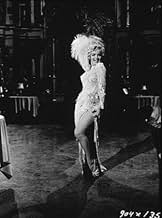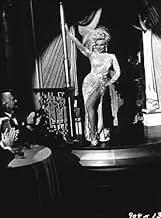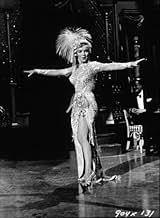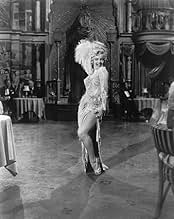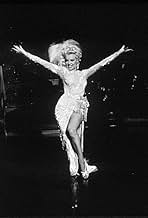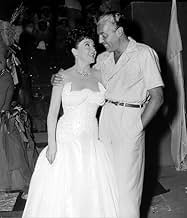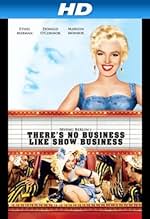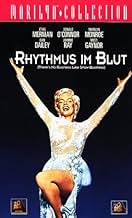AVALIAÇÃO DA IMDb
6,4/10
7,1 mil
SUA AVALIAÇÃO
Molly e Terry Donahue, além de seus três filhos, são os Cinco Donahue. O filho Tim conhece a moça do guarda-volumes Vicky e a família começa a desmoronar.Molly e Terry Donahue, além de seus três filhos, são os Cinco Donahue. O filho Tim conhece a moça do guarda-volumes Vicky e a família começa a desmoronar.Molly e Terry Donahue, além de seus três filhos, são os Cinco Donahue. O filho Tim conhece a moça do guarda-volumes Vicky e a família começa a desmoronar.
- Direção
- Roteiristas
- Artistas
- Indicado a 3 Oscars
- 4 indicações no total
Dorothy Abbott
- Showgirl
- (não creditado)
Dorothy Adams
- Nurse
- (não creditado)
Robert Adler
- Night Watchman
- (não creditado)
Aladdin
- Orchestra Violinist
- (não creditado)
Fred Aldrich
- Private Detective
- (não creditado)
- Direção
- Roteiristas
- Elenco e equipe completos
- Produção, bilheteria e muito mais no IMDbPro
Avaliações em destaque
When Darryl F. Zanuck virtually forced exhibitors and most of his fellow studio mogul rivals to adopt CinemaScope as a panacea for TV's devastation of Hollywood's weekly box office bonanza, he dictated that virtually all of Twentieth's output was to be filmed in that eye-stretching process. "There's No Business Like Show Business," directed by that old pro, Walter Lang, seems to be the prime example of Darryl's minions saying to their boss: "You want wide? We'll give you W-I-D-E!!"
Everything about it was designed and lensed to emphasize the original ratio of the CinemaScope process and viewing it on a video that isn't letterboxed must look like what a one-eyed person must experience in everyday life. I never did see it in a theater but I have seen it on a TV broadcast which more-or-less recreated its widescreen ratio. It's a glorious mish-mash. Every Berlin tune that could be stuffed into it is given at least one run-through; John de Cuir's production design must have occupied every inch of several of Twentieth's West Los Angeles soundstages; Ethel Merman, after her terrific movie repeat of her Broadway success in "Call Me Madam" for Fox (and now, as of 2005, available on video), trumpets away in number after number (Must have been an ear-rending experience over those original four-track stereophonic sound systems.); Dan Dailey, Donald O'Connor and Mitzi Gaynor give it their energetic best; and then there's Marilyn. What can we say, with all that so sadly, in her personal life, came after she reluctantly fulfilled her contractual obligation in this one? She dazzles in, let's face it, a rather vulgar way, and seems shoehorned in to boost the potential box office. And they even added Johnnie Ray, a huge jukebox success at the time (and, due to his hearing deficiency, performing his songs at an even greater volume than La Merman.)
All in all this one shouldn't be missed if you want to view an example of Hollywood at its brassiest, in a production fairly bulging with elements that may not coalesce very harmoniously but which was, no doubt, worth the price of admission to those movie palaces before they were carved up to become the precursors of today's sterile multiplexes.
Everything about it was designed and lensed to emphasize the original ratio of the CinemaScope process and viewing it on a video that isn't letterboxed must look like what a one-eyed person must experience in everyday life. I never did see it in a theater but I have seen it on a TV broadcast which more-or-less recreated its widescreen ratio. It's a glorious mish-mash. Every Berlin tune that could be stuffed into it is given at least one run-through; John de Cuir's production design must have occupied every inch of several of Twentieth's West Los Angeles soundstages; Ethel Merman, after her terrific movie repeat of her Broadway success in "Call Me Madam" for Fox (and now, as of 2005, available on video), trumpets away in number after number (Must have been an ear-rending experience over those original four-track stereophonic sound systems.); Dan Dailey, Donald O'Connor and Mitzi Gaynor give it their energetic best; and then there's Marilyn. What can we say, with all that so sadly, in her personal life, came after she reluctantly fulfilled her contractual obligation in this one? She dazzles in, let's face it, a rather vulgar way, and seems shoehorned in to boost the potential box office. And they even added Johnnie Ray, a huge jukebox success at the time (and, due to his hearing deficiency, performing his songs at an even greater volume than La Merman.)
All in all this one shouldn't be missed if you want to view an example of Hollywood at its brassiest, in a production fairly bulging with elements that may not coalesce very harmoniously but which was, no doubt, worth the price of admission to those movie palaces before they were carved up to become the precursors of today's sterile multiplexes.
There's No Business Like Show Business has the distinction of being the last of the Irving Berlin songbook musicals filmed. It came out the same year as White Christmas, also of the same genre.
Take a listen to the background music of films like Holiday Inn, Blue Skies, Alexander's Ragtime Band, and this one. I defy you to find one non-Berlin note in the film and that's no accident. The more songs of Irving Berlin used, the more money he made. He was one shrewd businessman Irving, most of the time.
The title song is identified with Ethel Merman and it was introduced in Annie Get Your Gun. Merman like Mary Martin had a conspicuous lack of success in Hollywood as much as she was an icon on Broadway. She only did the screen version of two of her Broadway hits, Anything Goes and Call Me Madam. That's two more than Mary Martin did.
Anyway, I think the genesis of There's No Business Like Show Business probably came about when Call Me Madam became such a hit and the movie money people saw how the chemistry was between her and Donald O'Connor. So O'Connor was signed to play one of her three children. The other two children were Johnnie Ray and Mitzi Gaynor.
The plot such as it is, is the story of the Donahue family between both World Wars. The father of the aforementioned children is Dan Dailey and he and Merman do some good Irving Berlin numbers together. I've always marvelled at how graceful Dan Dailey moved on the screen in his musical films. He was not a creative sort in the same way Fred Astaire or Gene Kelly were. Probably if he had been, his reputation would be higher today. But he was a pleasing entertainer every time you saw him.
By all accounts it wasn't a happy film for Ethel. Marilyn Monroe is in the film and Ethel was jealous of her. Not that Monroe wasn't her usual difficult self. Probably that helped the plot because it does call for the two to be at odds. Merman believes that Monroe has led Donald O'Connor astray.
Mitzi Gaynor was a wonderful talent as well. Too bad she wasn't born twenty years earlier, what a big star she would have been in the thirties and forties in Hollywood musicals then. Good singer and one fabulous dancer.
The plot does get kind of sticky in spots and Johnnie Ray didn't set the screen on fire when he wasn't singing. No accident he didn't become a film star.
Still for those of us who bless the day Irving Berlin put down his first notes of an original song, it's worth watching.
Take a listen to the background music of films like Holiday Inn, Blue Skies, Alexander's Ragtime Band, and this one. I defy you to find one non-Berlin note in the film and that's no accident. The more songs of Irving Berlin used, the more money he made. He was one shrewd businessman Irving, most of the time.
The title song is identified with Ethel Merman and it was introduced in Annie Get Your Gun. Merman like Mary Martin had a conspicuous lack of success in Hollywood as much as she was an icon on Broadway. She only did the screen version of two of her Broadway hits, Anything Goes and Call Me Madam. That's two more than Mary Martin did.
Anyway, I think the genesis of There's No Business Like Show Business probably came about when Call Me Madam became such a hit and the movie money people saw how the chemistry was between her and Donald O'Connor. So O'Connor was signed to play one of her three children. The other two children were Johnnie Ray and Mitzi Gaynor.
The plot such as it is, is the story of the Donahue family between both World Wars. The father of the aforementioned children is Dan Dailey and he and Merman do some good Irving Berlin numbers together. I've always marvelled at how graceful Dan Dailey moved on the screen in his musical films. He was not a creative sort in the same way Fred Astaire or Gene Kelly were. Probably if he had been, his reputation would be higher today. But he was a pleasing entertainer every time you saw him.
By all accounts it wasn't a happy film for Ethel. Marilyn Monroe is in the film and Ethel was jealous of her. Not that Monroe wasn't her usual difficult self. Probably that helped the plot because it does call for the two to be at odds. Merman believes that Monroe has led Donald O'Connor astray.
Mitzi Gaynor was a wonderful talent as well. Too bad she wasn't born twenty years earlier, what a big star she would have been in the thirties and forties in Hollywood musicals then. Good singer and one fabulous dancer.
The plot does get kind of sticky in spots and Johnnie Ray didn't set the screen on fire when he wasn't singing. No accident he didn't become a film star.
Still for those of us who bless the day Irving Berlin put down his first notes of an original song, it's worth watching.
Two scenes surprise, both with Marilyn Monroe: her singing of the "After You Get What You Want..." number in a ultra-tight, combination flesh-colored/white gown. It's obvious that the image portrayed is that she could be nude, with the frilly white covering her talents. The second is the famous "Heat Wave" number, in a skimpy outfit, with her navel appropriately covered, yet below is a flesh-colored "window" for more erotic symbolism. In 1954 nudity could NOT be shown, but those scenes probably BARELY squeaked by the censors. The film depicts the traveling, singing/dancing Donahue Family, headed by brassy Ethel Merman and Dan Dailey, with sons Donald O'Connor, Johnnie Ray (who wants to be a priest), and daughter Mitzi Gaynor. It's obvious the Monroe character was an afterthought to boost the film's success; the actress really didn't want to do the part, the studio allegedly counteracted by upping her salary and promising her the lead in "The Seven Year Itch" (1955). Nevertheless, Monroe looks great and is unforgettable, comedically, dramatically and musically. O'Connor is great fun and Gaynor is a knockout dancer. Between some slow stages, musical numbers are expertly staged, with magnificent sets and superb color schemes all throughout. The finale is surprisingly touching with a rousing title tune reprise by all; only way to watch this is on the pristine-restored widescreem (2:55 to 1) DVD.
Contrary to what a lot of people seem to think of this film, my biggest complaint with it is Marilyn Monroe. The studio shoehorned her into this film in their attempt to make the biggest musical extravaganza ever, and she just doesn't fit. She's so out of sync with the other characters that she might as well be from a different planet.
Don't get me wrong. I'm not a huge Marilyn fan, but she was good (and well-cast) in "Some Like It Hot". She's just all wrong for "No Business Like Show Business", and she looks and sounds ridiculous.
To be fair, Johnnie Ray often doesn't hold up well before modern audiences, either, when he sings. It's not that he's bad; it's that his style has come and gone and hardly been seen since. Everything in this movie tends to be at least a little overdone, and asking Johnnie Ray to exaggerate his singing does not produce flattering results.
Still, Donald O'Connor and Mitzi Gaynor are as brilliant and exuberant as you could hope. Ethel Merman is, well, Ethel Merman, and exactly right for her part. Dan Dailey is like a reliable locomotive that never disappoints.
The story is a bit plodding at times, but it only exists to set up one gala musical number after another. It only really bogs down when it gets caught up with Marilyn's character. If the studio had just left Marilyn out of it, perhaps giving Mitzi Gaynor the love interest role, and toned down the general effort level just a hair, this would've been one of the all-time greats.
It's still absolutely worth seeing -- in widescreen format, if you possibly can.
Don't get me wrong. I'm not a huge Marilyn fan, but she was good (and well-cast) in "Some Like It Hot". She's just all wrong for "No Business Like Show Business", and she looks and sounds ridiculous.
To be fair, Johnnie Ray often doesn't hold up well before modern audiences, either, when he sings. It's not that he's bad; it's that his style has come and gone and hardly been seen since. Everything in this movie tends to be at least a little overdone, and asking Johnnie Ray to exaggerate his singing does not produce flattering results.
Still, Donald O'Connor and Mitzi Gaynor are as brilliant and exuberant as you could hope. Ethel Merman is, well, Ethel Merman, and exactly right for her part. Dan Dailey is like a reliable locomotive that never disappoints.
The story is a bit plodding at times, but it only exists to set up one gala musical number after another. It only really bogs down when it gets caught up with Marilyn's character. If the studio had just left Marilyn out of it, perhaps giving Mitzi Gaynor the love interest role, and toned down the general effort level just a hair, this would've been one of the all-time greats.
It's still absolutely worth seeing -- in widescreen format, if you possibly can.
20th Century Fox was no match for MGM when it came to musicals. Daryl F. Zanuk decided to gamble with this film where the talents of a Broadway star, Ethel Merman, would be showcased. Ms. Merman in spite of being the toast of Broadway, never made it big in Hollywood. After all, she was not a radiant beauty, but oh, could she belt a song that could be heard at the top of the balcony! Phoebe and Henry Ephron were brought on board to write the screen treatment and Walter Lang directed.
The musical was also blessed in that Irving Berlin's music is heard throughout in all its glory. Ms. Merman was the perfect actress to interpret the songs written by Mr. Berlin. They made a perfect duo, even though, for some viewers not used to Ethel Merman's singing style, it might prove an uneasy combination.
The story is simple enough. It follows the Donahues from the early days of vaudeville through some glittering years after. Molly and Terence Donahue had two sons, Tim and Steve, and a daughter, Katy. As the children grow up, the parents' popularity began to recede. The film deals with Tim, as a young man, as he falls for Vicky Parker, a beautiful singer who makes it big on her own. Vickie, who is more interested in her own career neglects Tim. As a result, Tim goes on his own to find himself, away from his family and Vickie.
The best thing in the film is Ethel Merman. She was a legendary figure and as Molly Donahue, she is at her best. Dan Dailey was the perfect partner for Ms. Merman. Donald O'Connor is also seen doing some fine dancing. Marilyn Monroe was a lovely woman to look at. As a singer, she had a small voice, but she used it well making the songs her own. Mitzi Gaynor plays Katy. Johnnie Ray, a popular singer of that period is terribly miscast. His Steve is the worst thing in the movie.
Although predictable, this film has some great things going for it. Some of the musical numbers are well staged and will not disappoint. On the whole as the camaraderie expressed by the title of the film is evident in the musical.
The musical was also blessed in that Irving Berlin's music is heard throughout in all its glory. Ms. Merman was the perfect actress to interpret the songs written by Mr. Berlin. They made a perfect duo, even though, for some viewers not used to Ethel Merman's singing style, it might prove an uneasy combination.
The story is simple enough. It follows the Donahues from the early days of vaudeville through some glittering years after. Molly and Terence Donahue had two sons, Tim and Steve, and a daughter, Katy. As the children grow up, the parents' popularity began to recede. The film deals with Tim, as a young man, as he falls for Vicky Parker, a beautiful singer who makes it big on her own. Vickie, who is more interested in her own career neglects Tim. As a result, Tim goes on his own to find himself, away from his family and Vickie.
The best thing in the film is Ethel Merman. She was a legendary figure and as Molly Donahue, she is at her best. Dan Dailey was the perfect partner for Ms. Merman. Donald O'Connor is also seen doing some fine dancing. Marilyn Monroe was a lovely woman to look at. As a singer, she had a small voice, but she used it well making the songs her own. Mitzi Gaynor plays Katy. Johnnie Ray, a popular singer of that period is terribly miscast. His Steve is the worst thing in the movie.
Although predictable, this film has some great things going for it. Some of the musical numbers are well staged and will not disappoint. On the whole as the camaraderie expressed by the title of the film is evident in the musical.
Você sabia?
- CuriosidadesOne day, Marilyn Monroe's husband, Joe DiMaggio, visited the set. He refused to be photographed with Monroe, but insisted on being photographed with Ethel Merman, whom he called "my favorite star."
- Erros de gravaçãoDuring the "Heat Wave" number, Marilyn Monroe accidentally pokes her finger in the eye of a dancer standing between the branches of a prop tree.
- Citações
Molly Donahue: "Don't worry." Hmm. That's a laugh. You start worrying about your kids the day they're born and you never stop. Even after they bury you, I bet you never stop.
- Trilhas sonorasWhen the Midnight Choo-Choo Leaves for Alabam'
(uncredited)
Written by Irving Berlin
Performed by Ethel Merman and Dan Dailey
Later performed by Mitzi Gaynor and Donald O'Connor
Principais escolhas
Faça login para avaliar e ver a lista de recomendações personalizadas
- How long is There's No Business Like Show Business?Fornecido pela Alexa
Detalhes
Bilheteria
- Faturamento bruto mundial
- US$ 6.341
- Tempo de duração
- 1 h 57 min(117 min)
- Cor
- Proporção
- 2.55 : 1
Contribua para esta página
Sugerir uma alteração ou adicionar conteúdo ausente



